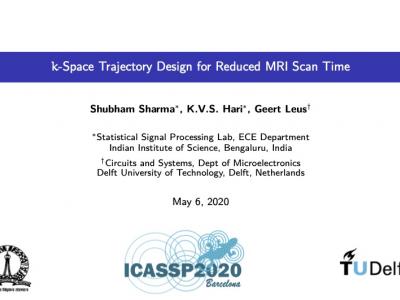Documents
Presentation Slides
K-SPACE TRAJECTORY DESIGN FOR REDUCED MRI SCAN TIME

- Citation Author(s):
- Submitted by:
- shubham sharma
- Last updated:
- 14 May 2020 - 3:39am
- Document Type:
- Presentation Slides
- Document Year:
- 2020
- Event:
- Presenters:
- Shubham Sharma
- Paper Code:
- 4741
- Categories:
- Log in to post comments
The development of compressed sensing (CS) techniques for magnetic resonance imaging (MRI) is enabling a speedup of MRI scanning. To increase the incoherence in the sampling, a random selection of points on the k-space is deployed and a continuous trajectory is obtained by solving a traveling salesman problem (TSP) through these points. A feasible trajectory satisfying the gradient constraints is then obtained by parameterizing it using state-of-the-art methods. In this paper, a constrained convex optimization based method to obtain feasible trajectories is proposed. The method is motivated by the fact that the readout time is proportional to the number of sample points and includes the lengths of the segments of the trajectory in the cost function to obtain variable length trajectories. The proposed method provides a reduction in readout time by more than 50% for random-like trajectories with an improvement of about 1.5 dB in peak signal-to-noise ratio (PSNR) and 0.0762 in structural similarity (SSIM) index on average for a realistic brain phantom MRI image adopting single-shot trajectories.

